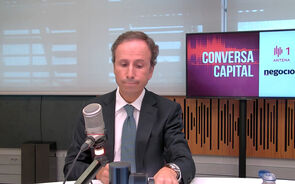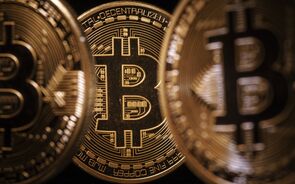The bears are back in business (Trading Ideas)
1 Mensagem
|Página 1 de 1
The bears are back in business (Trading Ideas)
The Bears are Back in Business.
By Mario Ricchio, Publisher and Editor of Ricchio Report
http://www.xtremeinvesting.com Jan 17, 2003 8:35:47 AM Email this article Print this article
If you haven’t bailed on stocks, now is the time. There are a host of fundamental reasons to avoid stocks. The S+P is trading at 30 times earnings, dividend yields are at historic lows, companies have no pricing power, and corporate expenses are rising. As we said before, a profit squeeze is upon us.
Is America’s competitive disadvantage structural or cyclical?
The United States has a dynamic economy that allows it too shift resources faster and more efficiently than any other economy. But our monetary system is destroying our ability to compete. In essence, monetary inflation has raised the domestic cost of living to the point that wages need to reflect a real estate bubble on fire. If real estate were cheaper, so would wages. If one lives in California, wages are higher. In Kansas, nominal wagers are lower as real estate prices stagnate. What I’m saying is our fiat monetary system causes the cost of living to rise in dollar terms to the point that wages accelerate to the upside. OK Ricchio, draw a conclusion. I will. If the Central Bank debases a national currency within a global economy, the debased economy prices its labor out of the global market. My theory is best illustrated from information in the latest King Report:
“China said on Friday exports rose 30.2% y/y in December to $31.89 Billion. Hewlett Packard will move more consulting and integration work to countries where costs are lower, including India and China. Our friend Al told us that he got a telemarketing call from India for a household name US company. Service jobs are fleeing now. When the public becomes aware of this, the outcry will be deafening. His friend Lacy noted that with wage and benefit costs, Japanese labor is $20/hour, Germany and France $18, US $12 and China $ .35, where should jobs flow. Finally Wolfe at JPM said- all the jobs that have been lost in the US in manufacturing have essentially been recreated in China. This means they ain’t coming back no matter how low the FED pushes rates or if Bush’s plan is implemented in total.”
As we can see, China’s cost of living in dollar terms is below that of the US. They aren’t experiencing an asset bubble in Real Estate. As such, property in the mainland affords lower wages. As for Japan, there labor cost structure is highly inefficient and anti-competitive. China looks to eat there lunch. Europe must reform there labor market and shift away from Unions. But the grand point is the three largest economies, US, Japan and Germany is at a labor cost disadvantage. More problematic, easy money will only serve to heighten the labor cost differential in favor of China. The more money the US prints the more expensive labor costs relative to China. Now if you were the CEO of a multinational based in the US, and you saw the labor costs for manufacturing in China and the labor costs for service in India relative to US wages, why keep employment in the US? You can hire a computer programmer in India to do the same job an American can for a fraction of the cost. While the US recession forces US managers to streamline costs, the shift will prove to be structural in nature until the US adopts an honest monetary unit.
Do we need more fundamental reasons to bet against this bear market rally? How about rising health care costs?
As Dow Jones reports, this week more than 17000 workers at GE’s two key unions staged a two day walk off. How bad is it for the employer and its profits? GE said health care cost rose 45% to $1.4 billion in 2002 from 1999. And as we said about health care costs GE validates, the company expects costs to rise an additional 15% this year and anticipates similar hikes in the near future. Another figure, overall spending on health care hit $1.4 trillion in 2001, and health care spending now accounts for 14.1% of the nation’s gross domestic product. Things are so bad, small and medium size companies may have to drop their coverage. And employers will pass some cost to the employee and reduce real wages. Dupont raised premiums 13% in 2003 and 135% for retirees over the age of 65. EDS anticipates a 15% rise in health care costs in 2003. As a result, workers will pay 22% of their premiums, compared to 19% last year. (The figures came from Dow Jones Newswire)
Still not convinced the Fundamentals stink?
From CNN Money, “In 2002, the average annual cost of homeowners insurance rose 8% to $553, according to Insurance Information Institute, and in 2003 that number is expected to rise 9 percent to $603.
More on China:
From Bloomberg, “Many US companies have transferred production to China, helping to explain the jump in Chinese exports. P+G has invested more than $300 million in China to date. The company has 6 production plants in China to make Head n Shoulders shampoo, Tide laundry, and Oil of Olay skin care products. Unilever has invested $1 billion dollars.
So we believe the US is at a structural labor disadvantage to China and India. The profits squeeze is on and the Federal Reserve easy money only makes matters worse. So if the fundamentals stink, why NOW are the bears in control?
Why the bears are in control?
Today all three major equity indices experienced a key reversal. Technically, that it happened is bearish but that it happened in a seasonally strong period is even more bearish and convincing. The VIX is also below 30 and consider it happening under geo-political concerns, accounting concerns, and a long bear market and one can surmise just how complacent the bulls and bears really are. The market is ripe to re-test the lows. Even as other bears, we are told, are scared of shorting this market, we don’t think the bears should be scared, the market is ready to head lower. The fundamentals stink and the technical picture darkened on January 15- a day we think will mark a major turning point.
From the floor level, my great friend and terrific source Morgan Paisley had an opinion on today’s market action. He said his opinion was the pension funds and the funds receiving cash inflows are buying stock and the traders are taking the other side of the trade. Traders think valuations are too high while pension funds are making up for a deficit in their long-term commitments. For the best broker in the business contact Morgan Paisley at 1(800) 216-1487…tell him Mario sent ya**
My opinion is that the traders are right and the market is overvalued and ripe for a pullback. The Intel news helped the bear cause as capital spending remains week, but the bears knew that and the bulls were delusional…what’s new?
So in a nutshell, the big traders are selling this market to under-funded pensions, when the money dries up this market will hit an air pocket, the fundamentals and technicals are screaming sell…but of course that is only our opinion
http://www.trading-ideas.com/MarketCommentary/mc011703-1.asp
By Mario Ricchio, Publisher and Editor of Ricchio Report
http://www.xtremeinvesting.com Jan 17, 2003 8:35:47 AM Email this article Print this article
If you haven’t bailed on stocks, now is the time. There are a host of fundamental reasons to avoid stocks. The S+P is trading at 30 times earnings, dividend yields are at historic lows, companies have no pricing power, and corporate expenses are rising. As we said before, a profit squeeze is upon us.
Is America’s competitive disadvantage structural or cyclical?
The United States has a dynamic economy that allows it too shift resources faster and more efficiently than any other economy. But our monetary system is destroying our ability to compete. In essence, monetary inflation has raised the domestic cost of living to the point that wages need to reflect a real estate bubble on fire. If real estate were cheaper, so would wages. If one lives in California, wages are higher. In Kansas, nominal wagers are lower as real estate prices stagnate. What I’m saying is our fiat monetary system causes the cost of living to rise in dollar terms to the point that wages accelerate to the upside. OK Ricchio, draw a conclusion. I will. If the Central Bank debases a national currency within a global economy, the debased economy prices its labor out of the global market. My theory is best illustrated from information in the latest King Report:
“China said on Friday exports rose 30.2% y/y in December to $31.89 Billion. Hewlett Packard will move more consulting and integration work to countries where costs are lower, including India and China. Our friend Al told us that he got a telemarketing call from India for a household name US company. Service jobs are fleeing now. When the public becomes aware of this, the outcry will be deafening. His friend Lacy noted that with wage and benefit costs, Japanese labor is $20/hour, Germany and France $18, US $12 and China $ .35, where should jobs flow. Finally Wolfe at JPM said- all the jobs that have been lost in the US in manufacturing have essentially been recreated in China. This means they ain’t coming back no matter how low the FED pushes rates or if Bush’s plan is implemented in total.”
As we can see, China’s cost of living in dollar terms is below that of the US. They aren’t experiencing an asset bubble in Real Estate. As such, property in the mainland affords lower wages. As for Japan, there labor cost structure is highly inefficient and anti-competitive. China looks to eat there lunch. Europe must reform there labor market and shift away from Unions. But the grand point is the three largest economies, US, Japan and Germany is at a labor cost disadvantage. More problematic, easy money will only serve to heighten the labor cost differential in favor of China. The more money the US prints the more expensive labor costs relative to China. Now if you were the CEO of a multinational based in the US, and you saw the labor costs for manufacturing in China and the labor costs for service in India relative to US wages, why keep employment in the US? You can hire a computer programmer in India to do the same job an American can for a fraction of the cost. While the US recession forces US managers to streamline costs, the shift will prove to be structural in nature until the US adopts an honest monetary unit.
Do we need more fundamental reasons to bet against this bear market rally? How about rising health care costs?
As Dow Jones reports, this week more than 17000 workers at GE’s two key unions staged a two day walk off. How bad is it for the employer and its profits? GE said health care cost rose 45% to $1.4 billion in 2002 from 1999. And as we said about health care costs GE validates, the company expects costs to rise an additional 15% this year and anticipates similar hikes in the near future. Another figure, overall spending on health care hit $1.4 trillion in 2001, and health care spending now accounts for 14.1% of the nation’s gross domestic product. Things are so bad, small and medium size companies may have to drop their coverage. And employers will pass some cost to the employee and reduce real wages. Dupont raised premiums 13% in 2003 and 135% for retirees over the age of 65. EDS anticipates a 15% rise in health care costs in 2003. As a result, workers will pay 22% of their premiums, compared to 19% last year. (The figures came from Dow Jones Newswire)
Still not convinced the Fundamentals stink?
From CNN Money, “In 2002, the average annual cost of homeowners insurance rose 8% to $553, according to Insurance Information Institute, and in 2003 that number is expected to rise 9 percent to $603.
More on China:
From Bloomberg, “Many US companies have transferred production to China, helping to explain the jump in Chinese exports. P+G has invested more than $300 million in China to date. The company has 6 production plants in China to make Head n Shoulders shampoo, Tide laundry, and Oil of Olay skin care products. Unilever has invested $1 billion dollars.
So we believe the US is at a structural labor disadvantage to China and India. The profits squeeze is on and the Federal Reserve easy money only makes matters worse. So if the fundamentals stink, why NOW are the bears in control?
Why the bears are in control?
Today all three major equity indices experienced a key reversal. Technically, that it happened is bearish but that it happened in a seasonally strong period is even more bearish and convincing. The VIX is also below 30 and consider it happening under geo-political concerns, accounting concerns, and a long bear market and one can surmise just how complacent the bulls and bears really are. The market is ripe to re-test the lows. Even as other bears, we are told, are scared of shorting this market, we don’t think the bears should be scared, the market is ready to head lower. The fundamentals stink and the technical picture darkened on January 15- a day we think will mark a major turning point.
From the floor level, my great friend and terrific source Morgan Paisley had an opinion on today’s market action. He said his opinion was the pension funds and the funds receiving cash inflows are buying stock and the traders are taking the other side of the trade. Traders think valuations are too high while pension funds are making up for a deficit in their long-term commitments. For the best broker in the business contact Morgan Paisley at 1(800) 216-1487…tell him Mario sent ya**
My opinion is that the traders are right and the market is overvalued and ripe for a pullback. The Intel news helped the bear cause as capital spending remains week, but the bears knew that and the bulls were delusional…what’s new?
So in a nutshell, the big traders are selling this market to under-funded pensions, when the money dries up this market will hit an air pocket, the fundamentals and technicals are screaming sell…but of course that is only our opinion
http://www.trading-ideas.com/MarketCommentary/mc011703-1.asp
- Mensagens: 235
- Registado: 5/11/2002 12:54
- Localização: Lisboa
1 Mensagem
|Página 1 de 1
Quem está ligado:
Utilizadores a ver este Fórum: cali010201, Google [Bot], PAULOJOAO, paulopereira.pp36.pp e 83 visitantes


